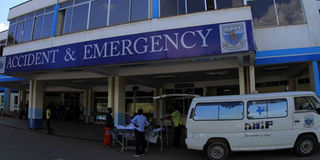Strike paralyses services at KNH

This image taken on March 23, 2018 shows the Kenyatta National Hospital casualty wing. Due to an ongoing strike, KNH is now only attending to emergency cases. PHOTO | JEFF ANGOTE | NATION MEDIA GROUP
What you need to know:
- KNH has about 600 consultants, 250 of whom are employees of the hospital, and 350 of the University of Nairobi.
- Chief executive Mutie said there were consultants and a few registrars employed by KNH and medical and clinical officer on standby.
Thousands of lives are at risk following paralysis of services at the Kenyatta National Hospital (KNH) due to the ongoing strike by registrars and lecturers.
A registrar is a doctor who is receiving advanced training in a specialist field of medicine in order to become a consultant.
The country’s biggest referral and training hospital is now only attending to emergency cases.
Non-urgent medical or surgical procedures done under anaesthesia have been suspended until the trainee doctors, known as registrars, who form a big part of the hospital’s medical staff, resume duties.
CONSULTANTS
The registrars went on strike early this month after their colleague was suspended over a botched brain surgery that sparked public outrage.
They have also cited poor working conditions, which they say makes their stay at the hospital unbearable.
A senior doctor at the hospital who declined to be named said that every department at the hospital has been affected. All the departments are operating below 20 per cent.
He describes the impact of the strike as huge.
The department of pathology, that plays a key role in the diagnosis of various diseases, especially cancer, is also affected.
KNH has about 600 consultants, 250 of whom are employees of the hospital, and 350 of the University of Nairobi.
THEATRE PROCEDURES
All the other KNH employees are not on strike, but without the rest of the group, work has been adversely affected.
“At the facility, we have over 700 university postgraduate doctors, commonly referred to as registrars, who are qualified, competent, experienced and registered by the medical board. They, too, offer critical services,” the senior doctor told the Nation on Saturday by phone.
As a result of the work boycott, the team of doctors at KNH said they are now forced to do away with elective clinics and theatre procedures until normalcy resumes.
The senior doctor revealed that at the department of reproductive health, there are 136 registrars and all of them are on strike.
“This leaves only 20 consultants in the department to give services. It has forced us to limit services to emergencies only.
"This has not only affected the maternity department but also all the other departments including surgery, anaesthesia, radiology, pathology and paediatrics,” the doctor revealed.
LABOUR WARD
The hospital’s labour ward which operates 24 hours requires four registrars during the day and four at night.
The ward has a capacity of 28 beds but always has over 100 patients with most of them sharing beds.
But, currently, there are only 10 patients. These are emergency cases which have been referred to KNH by county hospitals.
Kenyatta performs up to 30 caesarean-section procedures and 100 deliveries in a day when fully operational.
“If today we decide to open the doors of the labour ward to all patients, it means that by Wednesday all the 20 doctors will have exhausted their 40 hours (of work), which is a requirement by law and we (will have to) close the labour ward.
"Where will the mothers go? That’s why we are forced to scale down the services to a reasonable level,” a senior official at the hospital said.
“Today if we open the hospital to operate at full capacity we will have more complications than what we are having now,” the official added.
DOCTORS' STRIKE
However, acting chief executive officer Thomas Mutie said that the strike has not affected the operations of the hospital severely.
He said there were consultants and a few registrars employed by KNH and medical and clinical officer on standby.
However, the huge number of registrars who are on strike has affected the hospital’s output.
“Usually we have about 2,000 in-patients but right now we are having about 1,500 patients. The strike is not so bad like the other time when the doctors went on a three-month strike. We learnt how to handle our issues,” Dr Mutie said.
He said all the departments were working, though below capacity, and that the number of patients was low.
CANCER PATIENTS
For chemotherapy and radiotherapy, Dr Mutie said the patients were being treated at the cancer treatment centre since they rely on their doctors for the services and not the registrars.
“Most of the doctors at the centre are KNH employees, we are not having any problem with cancer patients,” Dr Mutie told the Nation in a phone interview on Thursday.
Kenya Medical Practitioners and Dentists Union (KMPDU) secretary-general Ouma Oluga said until KNH decides to pay all the registrars and lecturers allowances, they will not go to work.
He said that unlike other lecturers in other universities who are demanding implementation of their Collective Bargaining Agreement, medical trainers are just demanding their allowances, which have not been paid for over a year.
Without the lecturers, there are no supervisors to monitor the registrars.





